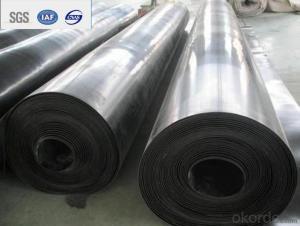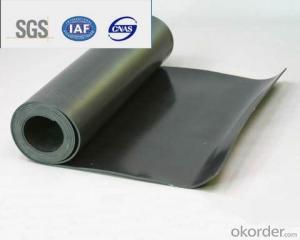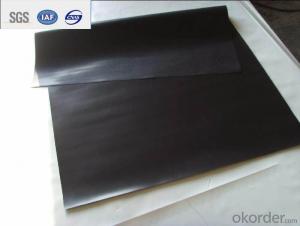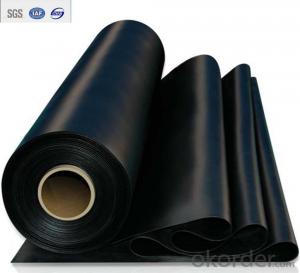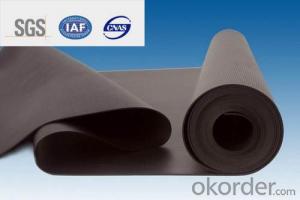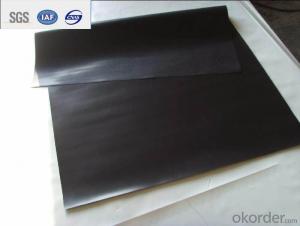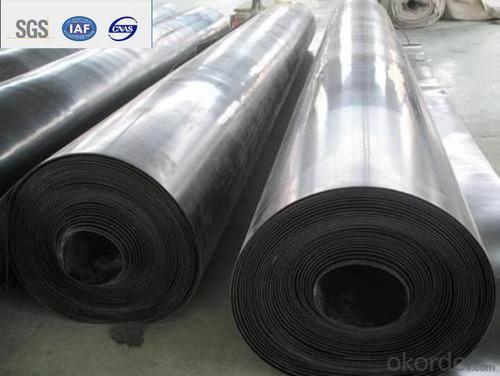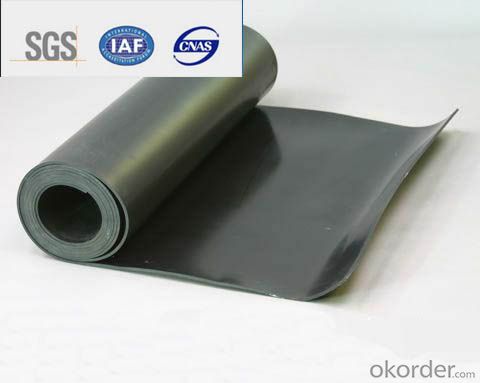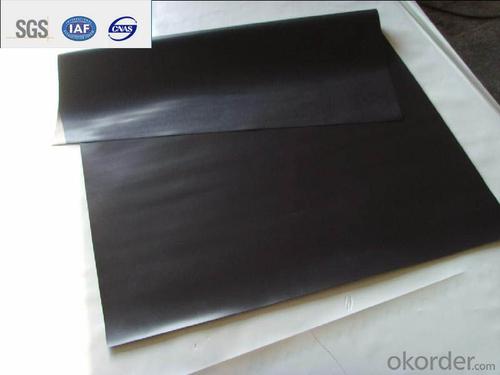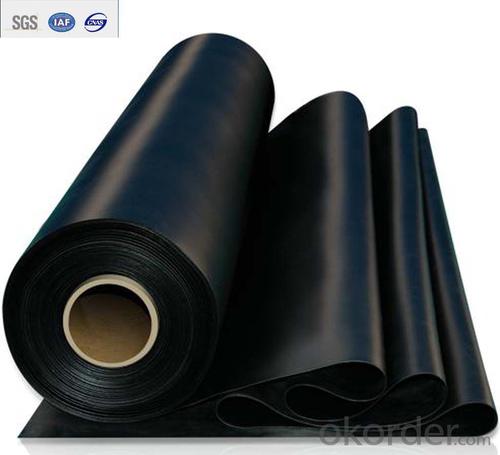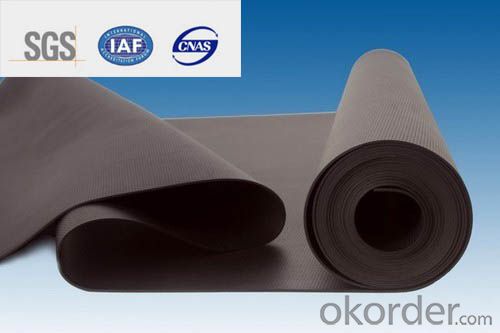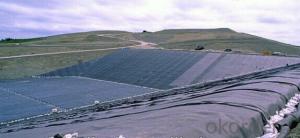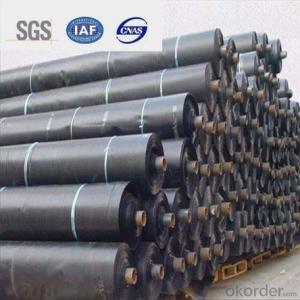EPDM Waterproofing Roofing Membrane with 1.2mm 1.5mm 2.0mm
- Loading Port:
- Qingdao
- Payment Terms:
- TT OR LC
- Min Order Qty:
- 2000 m²
- Supply Capability:
- 800000 m²/month
OKorder Service Pledge
OKorder Financial Service
You Might Also Like
Description Of EPDM Rubber Waterproof Membrane:
Waterproofing layer is imperfect: It’s hard to completely avoid weak points or breakages, which makes waterproofing layer with deficiencies or hidden defects more or less.
The main structure is with defects: It’s hard to completely avoid construction joint, deformation joint and small fissures in structure.
If there are weak points or breakage, water gets in and flude-channeling happens between the main structure and the waterproofing layer. In such cases, once the main structure is with defects, seepages would occur.
Main Features of EPDM Rubber Waterproof Membrane:
1. Excellent physical and mechanical performance
2. High tearing resistance
3. Good deformation adaptability
4. High puncture resistance
5. High aging resistance
6. UV resistance
Specifications of EPDM Rubber Waterproof Membrane:
| EPDM Waterproof Membrane ASTM Standard : D-7465 | ||||
| Property | Test Method | Units | Mininum ASTM | |
| D-7465 | ||||
| Sl | Eng | |||
| Specific Gravity | ASTM D-792 | gm/cc | 1.1 | 1.1 |
| Unit Weight | ASTM D-751 | kg/m2 | 1.3 | 0.27 |
| Thickness Type 1 | ASTM D-412 | mm(in) | 1.02 +15/-10% | 0.04 +15/-10% |
| Tensile Strength. Die C | ASTM D-412 | Mpa(psi) | 9 | 1305 |
| Ultimate Elongation,Die C | ASTM D-412 | % | 300 | 300 |
| Tear Resistance,Die C | ASTM D-624 | Kn/m(lbf/in) | 26.27 | 150 |
| Puncture Resistance | ASTM D-4833 | N(lbs) | 133 | 30 |
| Shore A Durometer | ASTM D-2240 | 65-10 | 65-10 | |
| Ozone Resistance | ASTM D-1149 | No Crack | No Crack | |
| Multiaxial Elongation | ASTM D-5617 | % | 100 | 100 |
| Heat Aging 28 days at 240 degrees | ASTM D-573 | |||
| Tensile Strength, Die C | ASTM D-412 | MPa(psi) | 8.3 | 1205 |
| Ultimate elongation, Die C | ASTM D-412 | % | 200 | 200 |
| Tear Resistance, Die C | ASTM-624 | Kn/m(lbf/in) | 21.9 | 125 |
| Accelerated Aging Xenon Arc | ASTM G-155/G-151 | Pass | Pass | |
| Brittleness Point | ASTM D-2137 | -45 °C | -49 °C F | |
| Water Absorption | ASTM D-471 | % | +8,-2 | +8,-2 |
| Water Vapor Permeability, max | ASTM E-96 | Permils | 2.0 | 2.0 |
| Linear Dimensional Change,max | ASTM-D-1204 | % | +/-1.0 | +/-1.0 |
| Chronic Toxicity Screening | EPA/600/4-89/001 ASTM E-729 | Method 1000.0 | Pass | Pass |
Applications of EPDM Rubber Waterproof Membrane:
Waterproofing, anti-seepage and moisture proof of side walls of basements, baseboards, head plates and roofs.
1.Roofs, Basement, Toilets
2. Industrial and civil building waterproofing
3. Geosynthetic liner for swimming pool, channels, irrigation system
4. Especially suitable for projects with high requirements in durability, anti-corrosion and deformation.
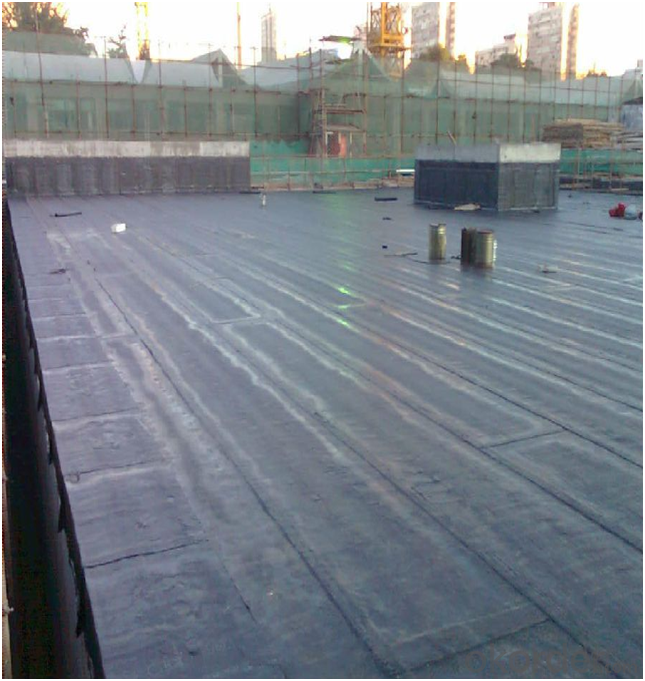
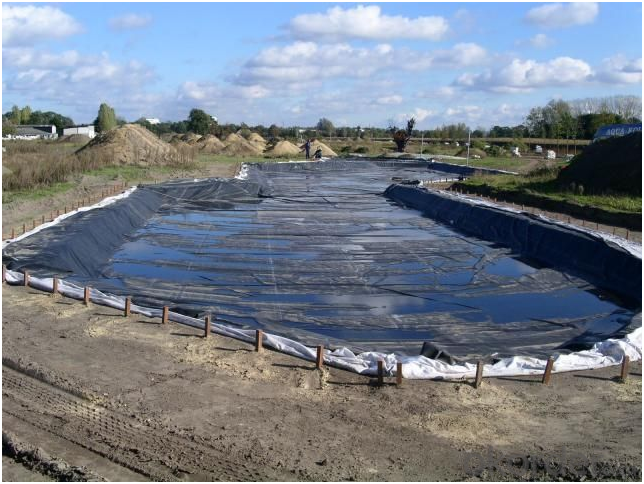
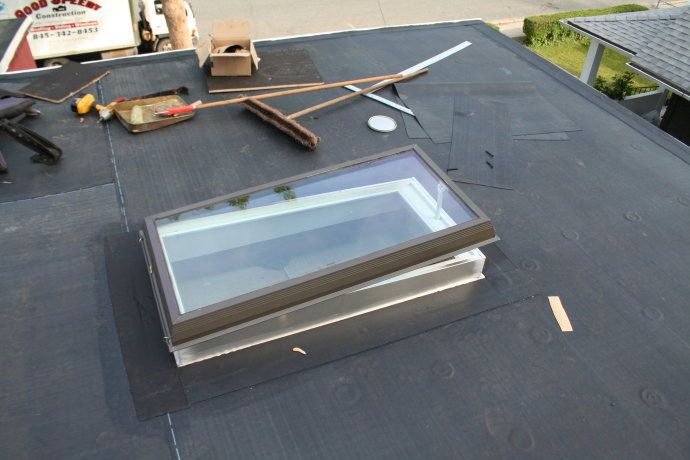
FAQ:
1. What are we supplying?
We are specialized in producing Colorful Asphalt Roof Shingle, SBS/APP modified bitumen waterproof membrane, Self adhesive bitumen waterproof membrane, PVC waterproofing membrane, EPDM rubber roofing membrane, Single Component Polyurethane Waterproof Coating, and Spray Polyurea Waterproof Coating.
2. How Many years experience do we have?
We have been exported to more than 20 countries in the past 15 years.
3. How long do we usually reply your request?
We always reply our customer within 24 hours.
- Q: What is the preferred level of waterproofing?
- 3, roof 3 waterproof: Application: general building; Waterproof layer of reasonable use of life: 10 years; Waterproof layer selection of materials: should choose three asphalt four oil asphalt waterproofing membrane, polymer modified asphalt waterproofing membrane, synthetic polymer waterproofing membrane, metal sheet, polymer modified asphalt waterproof coating, synthetic polymer waterproof coating , Fine stone concrete, flat tile, felt tile and other materials;
- Q: Are waterproofing membranes suitable for tunnels?
- Tunnels can benefit from the use of waterproofing membranes. These structures often face significant water pressure from the surrounding soil and groundwater, making them susceptible to water entering. Waterproofing membranes are specifically designed to create a protective barrier that prevents water infiltration into the tunnel. These membranes are typically crafted from durable materials like bitumen, PVC, or EPDM rubber. These materials possess a resistance to water penetration, making them ideal for the task. Once applied to the tunnel walls and ceiling, they form a continuous and impermeable layer that effectively keeps the tunnel dry. Additionally, the membranes are flexible, allowing them to adjust to any movement or settlement within the tunnel while maintaining their waterproofing integrity. Apart from their water-blocking capabilities, these membranes offer other advantages for tunnels. They can shield the structure from corrosion caused by water and chemicals, thereby prolonging the tunnel's lifespan. Furthermore, they can improve the indoor air quality by preventing the growth of mold and mildew, which tend to thrive in damp environments. Moreover, waterproofing membranes can be tailored to suit the specific conditions of different tunnels. For instance, in tunnels exposed to high levels of hydrostatic pressure, reinforced membranes with greater tensile strength can be used to withstand the additional stress. Similarly, tunnels that prioritize fire safety can utilize membranes with enhanced fire resistance properties. In conclusion, waterproofing membranes provide a dependable and efficient solution for ensuring the durability, safety, and longevity of tunnels. By serving as a robust barrier against water ingress, they effectively safeguard these structures.
- Q: Can waterproofing membranes be used on utility manholes?
- Yes, waterproofing membranes can be used on utility manholes. Waterproofing membranes are specifically designed to provide a barrier against water infiltration, making them suitable for use in areas where water is present, such as manholes. These membranes are typically applied to the walls and floors of the manhole to prevent water from seeping through and causing damage to the structure or the utilities within. By effectively sealing off the manhole, waterproofing membranes help to maintain the integrity and functionality of the utilities and prevent water-related issues such as corrosion, leaks, and the degradation of materials. Additionally, waterproofing membranes can also provide protection against other elements such as chemicals, gases, and soil contaminants that may be present in or around the manhole. Therefore, using waterproofing membranes on utility manholes is a common practice to ensure their long-term durability and functionality.
- Q: Can a waterproofing membrane be used on tunnels with subway systems?
- Tunnels with subway systems can indeed benefit from the use of a waterproofing membrane. It is strongly advised to incorporate this protective layer into subway tunnel construction to prevent water infiltration and potential harm to the structure and electrical systems. The waterproofing membrane acts as a barrier, effectively excluding water and safeguarding the tunnel against issues caused by moisture, such as corrosion, mold, and deterioration. It is crucial to select a waterproofing membrane that is specially designed for tunnel use and capable of withstanding the unique challenges and conditions of subway systems, including heavy traffic loads, vibrations, and exposure to chemicals. Moreover, it is essential to ensure the installation of the waterproofing membrane is carried out by experienced professionals who adhere to the appropriate guidelines and specifications, guaranteeing its effectiveness and durability.
- Q: Where can waterproofing membranes be used?
- Waterproofing membranes can be used in a variety of applications such as basements, roofs, bathrooms, swimming pools, tunnels, and foundations to prevent water penetration and protect the underlying structures from damage.
- Q: Can a waterproofing membrane be used for highway or road projects?
- Yes, a waterproofing membrane can be used for highway or road projects. It acts as a protective layer against water infiltration, preventing damage to the road structure and increasing its lifespan. Additionally, it helps to reduce maintenance costs and provides a smoother and safer driving surface.
- Q: Can a waterproofing membrane be used in renovation or retrofitting projects?
- Certainly, a waterproofing membrane is a viable option for use in renovation or retrofitting endeavors. In fact, it often plays a crucial role in these projects, guaranteeing the long-term resilience and safeguarding of the building or structure. Waterproofing membranes are specifically designed to establish a barrier against moisture infiltration, effectively thwarting water damage, mold proliferation, and structural decay. When engaging in renovation or retrofitting tasks, it is not uncommon to encounter predicaments such as leaks, cracks, or deteriorated building materials that undermine the building's waterproofing system. In such scenarios, the application of a waterproofing membrane over the affected areas proves to be a reliable method of sealing and protecting them from further harm. This can be accomplished both internally and externally, tailored to the specific requirements at hand. Waterproofing membranes are available in a variety of forms, including sheet membranes, liquid coatings, or spray-applied membranes. They can be employed on various surfaces such as roofs, walls, basements, and even foundations. These membranes possess qualities such as flexibility, durability, and resistance to water and other environmental pressures, rendering them exceptional for renovation or retrofitting undertakings where augmenting the building's waterproofing capabilities is imperative. In conclusion, it is highly advisable to incorporate a waterproofing membrane into renovation or retrofitting ventures to ensure the endurance and integrity of the building. It serves as a proactive measure to preclude future water damage, preserve structural stability, and enhance the overall quality of the revitalized or retrofitted space.
- Q: Can waterproofing membranes be used on expansion joints?
- Yes, waterproofing membranes can be used on expansion joints. These membranes are designed to create a barrier against water penetration and can effectively seal and protect expansion joints from moisture damage.
- Q: Can a waterproofing membrane be used for green roofs?
- Yes, a waterproofing membrane can indeed be used for green roofs. Waterproofing membranes are commonly used as a crucial layer in green roof construction to prevent water leakage and protect the underlying structure. It provides an effective barrier against water infiltration, ensuring the green roof system remains watertight and preserving the integrity of the building.
- Q: How does a waterproofing membrane handle settlement cracks?
- Waterproofing membranes are specifically designed to address settlement cracks by offering a continuous and flexible barrier that effectively blocks water infiltration. Settlement cracks arise when the ground beneath a structure shifts or settles, resulting in foundation cracks. These cracks can allow water to seep into the building, causing moisture damage and potential structural problems. In the event of a settlement crack, applying a waterproofing membrane to the affected area creates a seamless and watertight seal. This membrane acts as a protective layer that prevents water from entering through the crack and penetrating the building. Furthermore, it plays a vital role in maintaining the foundation's structural integrity by reducing the likelihood of additional cracking and deterioration. The flexibility of the waterproofing membrane is essential in handling settlement cracks. It can accommodate the movements of the underlying structure without compromising its performance. As the ground settles or shifts, the membrane stretches and contracts, ensuring that the crack remains sealed and the waterproofing system remains intact. Moreover, certain waterproofing membranes possess self-healing properties. This means that if a settlement crack does occur, the membrane has the ability to reseal itself, preserving its watertight integrity. This self-healing capability minimizes the need for frequent repairs and maintenance, leading to time and cost savings for property owners. In conclusion, a waterproofing membrane is a highly effective solution for addressing settlement cracks. It provides a durable and flexible barrier that prevents water infiltration, guards against further damage, and contributes to the longevity of the structure.
Send your message to us
EPDM Waterproofing Roofing Membrane with 1.2mm 1.5mm 2.0mm
- Loading Port:
- Qingdao
- Payment Terms:
- TT OR LC
- Min Order Qty:
- 2000 m²
- Supply Capability:
- 800000 m²/month
OKorder Service Pledge
OKorder Financial Service
Similar products
Hot products
Hot Searches
Related keywords
